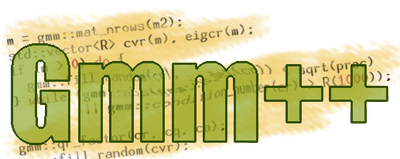
Gmm++ Documentation
Gmm++ Documentation is here (html version)
Download Gmm++
The last stable release of the standalone Gmm++ library can be found in the download page of GetFEM++.
What is Gmm++
Gmm++ is a
generic C++ template library for sparse, dense and skyline
matrices. It is a set of generic algorithms (mult, add,
copy, sub-matrices, dense and sparse solvers ...) for any
interfaced vector type or matrix type. It can be view as a glue
library allowing cooperation between several vector and matrix
types. However, basic sparse, dense and skyline matrix/vector types are built
in Gmm++, hence it can be used as a standalone linear algebra
library.
Interfacing a vector or matrix type means writing "traits" objects called
"linalg_traits", which describe their properties. The library
offers predefined dense, sparse and skyline matrix types.
The goal is to create a general, adaptable and easy to use
framework of pre-defined methods for matrix computation. When a
vector or a matrix type has been interfaced (i.e. its
linalg_traits has been filled), all generic algorithms works on
it. However, it is always possible (and easy) to specialize some
generic algorithms for efficiency reason. Major generic
algorithms are
- A set of miscellaneous generic commands (clear, clean, scalar product, scale, norms, ...)
- Vector-Vector addition with the possibility to mix formats (sparse, dense, skyline)
- Matrix-Vector mult for any format.
- Matrix-Matrix mult with the possibility to mix formats (sparse, dense, skyline, row major, column major, ...)
- Generic linear solvers (cg, bicgstag, qmr, gmres ...) with preconditioners for sparse matrices (ILUT, ILUTP, ILDLT, ...). Some of them are imported form ITL (eventually corrected and optimized), some of them are new.
- Reference to sub-matrices (with sub-interval, sub-slice or sub-index) for any sparse dense or skyline matrix for read or write operations.
- LU and QR factorizations for dense matrices.
- Eigenvalues computation for dense matrices.
The structure of Gmm++ is largely inspired from MTL. The major differences are : simpler use, built as an interface for existing matrix types, sub-matrices for any matrix types. The efficiency is comparable (see http://grh.mur.at/misc/sparselib_benchmark/ for instance).
NOTE : For performance reason, an interface with LAPACK or ATLAS is provided for dense matrices. See the documentation (if you make some benchmarks, do not forget to use optimization compiler options, at least -O3 and you should disable checks with -dNDEBUG).
A small interface to SuperLU 3.0 (sparse matrix direct solver) is also proposed for sparse matrices.
Gmm++ has been tested with QD an efficient library for double double and quadruple double precision. See on the documentation how to link QD. This means that Gmm++ should work with any reasonable arbitrary precision floating point library.
Licence
Gmm++ is freely distributed under the terms of the Gnu Lesser General Public License, either version 2.1 of the license or any later version.Contribute to Gmm++
Gmm++ offers a framework to develop efficient methods for linear algebra. This library is and will remain open-source. Here are some examples of possible extensions:
- Specialize some algorithms to optimize them for particular matrix implementation.
- New solvers and preconditioners.
- Eigenvalues computation for sparse matrices.
- ...
Gmm++ contributors
Yves Renard, Julien Pommier, Michel Fournie (Additive Schwarz), Benjamin Schleimer (least square CG).
Many thanks to Jeremy G. Siek and Lie-Quan Lee for their nice work developing MTL-ITL on which Gmm++ is greatly inspired.
Random test procedures
A problem with generic programming is to be sure that every configuration has been fully tested. This is why there is now a random generator of tests. This means that a number of test procedures will be called with random parameters, i.e. random type of vector, sub-vector, matrix or sub-matrix types, with random base type (float, double, long double, std::complex<float>, std::complex<double>, dd_real ...) and random size and filling, testing all the possibilities of mixing formats in operations such as mult, add ...
You are encouraged to test them, runing a "make check" on the distribution of Gmm++ and sending us a bug report if it fails. We will also appreciate if you send us new test procedures.
